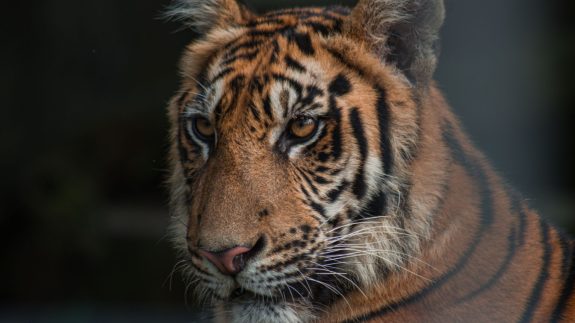On Halloween, many zoos and wildlife parks across the country open up for “Boo at the Zoo” events. These are often billed as late-night zoo experiences with haunted houses, carnival rides, live music and loud spooky halloween displays. Some zoos have even had fireworks displays in the past.
But what about the physical and mental stress caused to animals by these nightly shows? Animals cannot escape the constant noise and enthusiastic crowds. What appears to be a fun night out for the family is a living nightmare for the animals who are confined in the facilities.
Research is clear that the presence of zoo visitors itself can have a detrimental impact on animal welfare. Visitors outside normal opening hours, with loud noises, while animals would normally be resting, may be even more harmful.
Fireworks can harm animals even when they are not set off at or near zoos. Animals often try to flee the sudden, loud noise—causing numerous companion animals to go missing—while others are injured when they fly or run into roads, fences, and trees. For animals who are confined and cannot flee, the stress is higher still.
Even zoo events that do not feature fireworks can cause serious harm to animals. DJs, live music, and other loud noises at late night zoo events are all concerning. Animals in enclosures have nowhere to escape the nightly Halloween festivities.
Studies clearly show that loud concerts and other noise on zoo grounds cause significant stress to many animals. For instance, one study of two domestic dog species (canis lupus familiaris) at the Taronga Zoo in Sydney, Australia found that hosting concerts on the zoo grounds caused a variety of behaviours typically associated with fear or anxiety (albeit at low levels). More specifically, there was more “whining, shaking, panting and destructive behaviour”, as well as potential instances of “hiding.”
A separate study at Honolulu Zoo, in Hawaii, USA found that evening concerts disrupted breeding attempts, among other natural behaviours, of wild-born honeycreepers (a tropical bird). More recently, in May 2021, Boston’s Franklin Park Zoo itself reported serious concerns regarding the impact that nearby loud music has had on the behavior of the animals at the facility. The CEO of the facility, John Linehan, stated that animals in the zoo have begun showing signs of stress and agitation (e.g., pacing, hiding, and retreating) in response to the music and other loud noises.
Several captive animal facilities have opted to scrap their late night parties over concerns about noise and stress to animals, as well as dangerous and harmful behaviour on the part of rowdy visitors. It’s time for Canadian facilities to follow suit and do away with these outdated celebrations.
Zoos and wildlife parks are already rife with animal welfare concerns. Animals are condemned to a lifetime behind bars, often in isolation or social groups that are unsuited to them, and in cages which can never simulate their natural habitats or climates. This Halloween, don’t make their nightmare of captivity more scary than it already is. Keep your celebrations animal-free.




